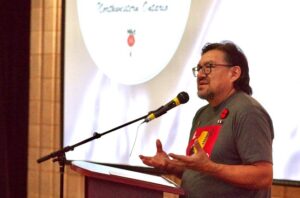Remembering Indigenous veterans

By Rick Garrick
THUNDER BAY — The vision of the late Red Rock Indian Band veteran Charles “Willy” John, who founded the Native Veterans Association of Northwestern Ontario, was highlighted at Lakehead University’s National Indigenous Veterans Day ceremony.
“I got to travel with Willy around the region meeting different people, collecting stories and starting to learn how to use a little bit of technology,” says David Thompson, research developer and project manager for the Native Veterans Association of Northwestern Ontario and Biinjitiwaabik Zaaging Anishinaabek citizen. “I interviewed people across the region, earned their trust, and they provided me with some oral stories. As Anishinaabe people, that is our tradition—to pass everything down through oral stories.”
Thompson says John wanted him to put the oral stories he had gathered into a book for students to learn in school.
“It’s important to learn the military history of Anishinaabe,” Thompson says. “We get $4 a year since 1850, but in 1812, we were allies of the Crown, and we still view ourselves that way. We are the First Nations, we are distinct people on our lands in a place they call Canada, and it’s very important to recognize and remember the efforts that our people put forth in terms of human resources going out and getting caught up in these battles.”
Thompson says Indigenous veterans volunteered to serve the country during World War I, World War II, the Korean War, and other war and peace-time commitments up to the current time.
“We are only a very small percentage of the total population of Canada but yet when you compare us to any other group, we have the highest percentage of volunteers enlisted,” Thompson says.
Thompson says they hired four university students from Lakehead University in 1997-98 to create the website for the Native Veterans Association of Northwestern Ontario, which is archived.
“They did a wonderful job, they got nominated for a national award for our website,” Thompson says. “It’s been up since 1998. It’s still relevant, the material that’s in it, but we’d like to take it a step further.”
Thompson says they have been approached by Lakehead University’s Indigenous Initiatives department to create a travelling exhibit in partnership with various organizations in Thunder Bay.
“I think that’s really important, partnerships, building trust again as part of Truth and Reconciliation,” Thompson says. “Our history as veterans is not a pretty one, just like the previous speaker mentioned, we got shortchanged when our veterans came back, we got shortchanged on land.”
Thompson says the Indigenous veterans also could not get into the Royal Canadian Legions across the country because the Indian Act said they could not be served alcohol.
“After several years of lobbying the government, our Chiefs and our people finally had some relief,” Thompson says. “Changes came to the Indian Act in 1952 that took out that section, that we couldn’t have pow wows, we couldn’t be served alcohol. Now because of all those changes, we are starting to get our colours back, our beautiful colours, we’re starting to get our strength back, we’re on a path of reconciliation and getting access to things everybody else takes for granted, such as clean water, adequate housing.”
Thompson says he is still researching and collecting stories and pictures of Indigenous veterans.
“And I will continue to do that as long as the Creator grants me life on this world,” Thompson says.
Lakehead University’s National Indigenous Veterans Day ceremony also featured a variety of speakers, including Fort William Elder Sheila DeCorte, who did an opening prayer; Lakehead University President Gillian Siddall; Jan Ritchie, an Indigenous veteran from Saugeen; Michael de Jong, curator/archivist at the Thunder Bay Museum; Alain Joseph, acting manager, Indigenous Relations at the City of Thunder Bay; Michel Beaulieu, honorary colonel at the Lake Superior Scottish Regiment and associate vice provost Academic (Special Projects) at Lakehead University; and Brandon Rhéal Amyot, acting president at the Lakehead University Student Union and vice-president of LUSU Orillia.

